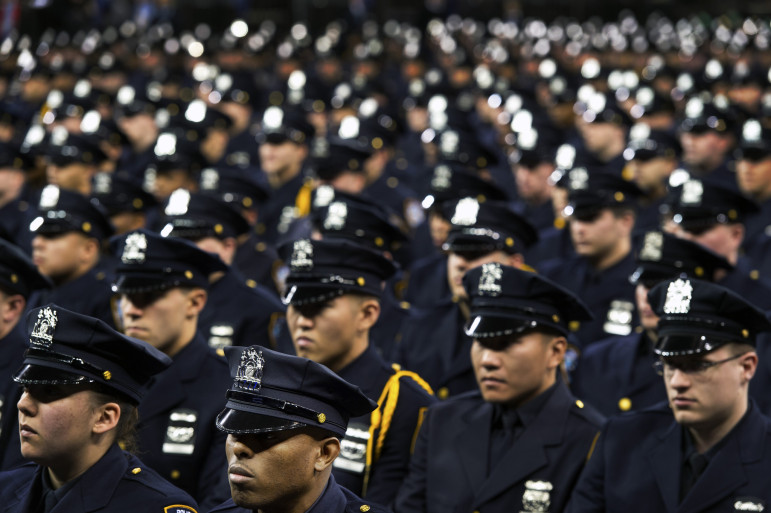
Demetrius Freeman/Mayoral Photography Office
Cadets at the December 2014 graduation from the NYPD academy.
In response to public outcry over the Eric Garner’s death at the hands of NYPD officers this past July, Commissioner Bill Bratton has tried to downplay concerns about “Broken Windows” policing.
Many critics say that Garner’s arrest—for selling loose cigarettes—illustrated the excesses of an approach premised on targeting small signs of disorder in order to prevent larger crimes from occurring. But Bratton insists that his signature policy merely reflects popular sentiment.
“It’s the law-abiding citizens themselves that are reaching out about the crime in their neighborhood,” Bratton told WNYC’s Brian Lehrer last August. “We go where the concerns are expressed.”
As evidence, Bratton has consistently referred to the sizable number of calls to both the city’s 911 operators and its 311 system, which handles the complaints about non-emergency issues akin to actual broken windows.
Public input into policing is certainly not a bad thing, but the uneven pattern of Broken Windows enforcement suggests that the NYPD isn’t responding to all complaints equally. While 911 records are not readily accessible, patterns found in 311 data illustrate the point.
In the six-week period leading up to the Garner incident, the North Shore of Staten Island indeed had one of the highest rates of complaints for what the 311 system categorizes as “Quality of Life” issues. That said, the numbers merit further scrutiny.
Of the 129 total calls, over 80 percent fell into the sub-categories of “standing water” or “animal abuse.” Only three calls during that period concerned “vending,” which would potentially include Garner’s alleged infraction. Meanwhile, in the 311 category of “Public Safety,” the total calls on the North Shore ranked in the lower range across the city.
Thus, without further documentation of the 911 calls in that area during the prelude to the Garner arrest, it’s difficult to identify an outpouring of local concern regarding the problems posed by cigarette vending in North Shore neighborhoods like Tompkinsville. (Jeremy Saunders of VOCAL-NY also stresses that many of the lowest-level Broken Windows violations—e.g. public urination or riding a bike on the sidewalk—that result in summonses and sometimes arrests would not be routed through the 911 system, anyway.)
Neither is there a clear correlation between 311 calls and Broken Windows enforcement in other areas of the city. As Matt Chaban recently reported in the Times, from Jan. 5-11, officers in the 84th precinct in Downtown Brooklyn wrote nearly 3,300 tickets—but the number of 311 calls in the Quality of Life and Public Safety categories during that same week was a whopping 12.
Whether or not neighbors call 311 to report problems thus seems to have little bearing on NYPD’s Broken Windows enforcement. Meanwhile, there are multiple factors that influence a person’s decision to call 911 to report any crime, serious or otherwise.
For starters, the people Bratton refers to as “law-abiding” are also those who feel comfortable calling the police. There are several large groups who may not feel comfortable doing so, among them undocumented immigrants as well as documented newcomers unfamiliar with policing in the U.S.
And according to Bob Gangi, director of the Police Reform Organizing Project, “many people of color in the city do not trust the police, given the hostile climate of the last few decades.” As evidence, he points out that 91 percent of the city’s 227,000 misdemeanor arrests in 2013 involved people of color.
The local residents and business owners who speak up about neighborhood problems—whether at precinct meetings, or via either 311 or 911—have every right to do so. But it’s the police department’s job to “protect and serve” everyone in the city, not just those who directly reach out to them.
Given the overall drop in crime in New York City, officers on the beat have more time to look around for genuine signs of disorder—and they don’t need to criminalize the poor in order to keep the city safe.

Theodore Hamm is chair of journalism and new media studies at St. Joseph’s College in Clinton Hill, Brooklyn. He was a co-founder of The Brooklyn Rail, and editor from 2000-2013. Follow him on Twitter @HammerDaily.










2 thoughts on “Op-Ed: Few Links Between Complaints and Broken-Windows Policing”
Pingback: There Are Lies, Damn Lies and Then There’s ‘Community Policing’ | Omaha Sun Times
Pingback: There Are Lies, Damn Lies and Then There’s ‘Community Policing’ | Political Ration